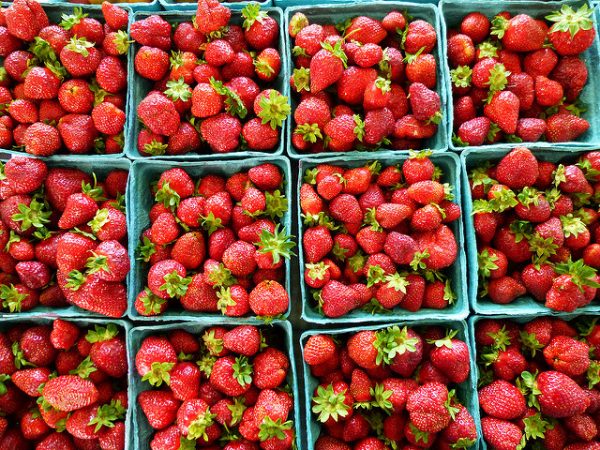A Friday Chat About Food Politics

Photo credit: Mike Licht, CC BY 2.0.
NICOLE: Happy Friday!
ALISON: Happy Friday to you!
NICOLE: Do you get a long weekend, or will you be working as usual?
ALISON: I am taking a four-day weekend for potty training boot camp! Otherwise I would just get Monday off.
NICOLE: Awwwwww! I have heard about the “get it over with” potty training method. What kind of prep does that require?
ALISON: Read a book and get on the same page as your co-parent. Verbally prepare the kiddo without stressing him out. Clear the calendar for 3-4 days and plan to be pants-less in the house. Extra juice boxes to increase “teachable moments” and extra waterproof mattress pads if you’re attempting night training too! We always have Folex or “Kids & Pets” on hand…
NICOLE: I appreciate why they called it that, but “Kids & Pets” is kind of a terrible name for a carpet and upholstery cleaner. Still, if it does the job…
ALISON: Ha! how about your weekend?
NICOLE: My sister, brother-in-law, and nephew are visiting! We were thinking about going to Old MacDonald’s Farm (yes, that’s what it’s called) but the weather is supposed to be in the mid-90s so it might be too hot.
ALISON: Oh but that sounds fun. Hope you can stay cool though. My in-laws were all just here last week. Maybe that’s why my food spending was so high!
NICOLE: On that note, when you reached out about the Friday Chat, you said you wanted to discuss your work at a fair trade food co-op.
ALISON: Yes! I am a worker-owner at Equal Exchange.We are a worker-owned fair trade food company. I have been there for 16 years. So food politics and conscious consumerism is my bread and butter (pardon the pun).
NICOLE: What do you mean by “food politics?”
ALISON: Good question! On the one hand, it’s the policies — trade agreements, agricultural subsidies, other legislation — that shape our access too food, its costs, and farmers’ access to markets. It’s also business practices and the consolidation of every single step of the food chain, from farms to food processors to distributors to retailers. It’s who grew or prepared your food and what their jobs are like. And then it’s discerning your own food values, accessing reliable information about the things that are important to you, and deciding what to do with that information.
NICOLE: And I’m guessing that part of your work at Equal Exchange involves discussing those values with other worker-owners and making decisions appropriately?
ALISON: Yes and no. We are a co-op but we have a management structure, so typically the worker-owners set the mission and elect the Board, the Board sets benchmarks for management, and management makes day-to-day decisions. What’s a fair price for dried mangoes? Is this producer group democratically run? What’s our wholesale price on an item, will there be enough demand? And having those conversations with customers too. But we all discuss these things all the time — we have lots of feedback loops.
NICOLE: How has your relationship to food changed since you started working there?
ALISON: I feel more passionately about organics because I have met producers and slept in their homes. It really upsets me that the conversation about organic in our country is about the trace levels of pesticides on consumers’ food, or about the earth in general, when the farmers and farm workers handling food are the real reason to buy organic. That said, I am no longer single and childless and am “smarter” with my money now, so I still don’t buy as much organic as I’d like.
NICOLE: What advice do you have for Billfold readers who want to be more thoughtful about their food choices?
ALISON: I would suggest thinking about where you shop. If you can afford to shop small, support food co-ops and independent grocery stores. They are generally putting more thought into selecting vendors based on their values, and they typically put more money back into the local economy through wages and benefits as well as sourcing. But another approach is to pick one item or meal that is doable or important to you, and “invest” in food systems that fit your values for that product. When I was fresh out of college interning for a non-profit, I went organic with my coffee — that meant organic fair trade coffee, organic half-and-half and organic sugar. My budget could handle that and my conscience could too. Give yourself permission NOT to obsess about every bite!
Support The Billfold
The Billfold continues to exist thanks to support from our readers. Help us continue to do our work by making a monthly pledge on Patreon or a one-time-only contribution through PayPal.
Comments